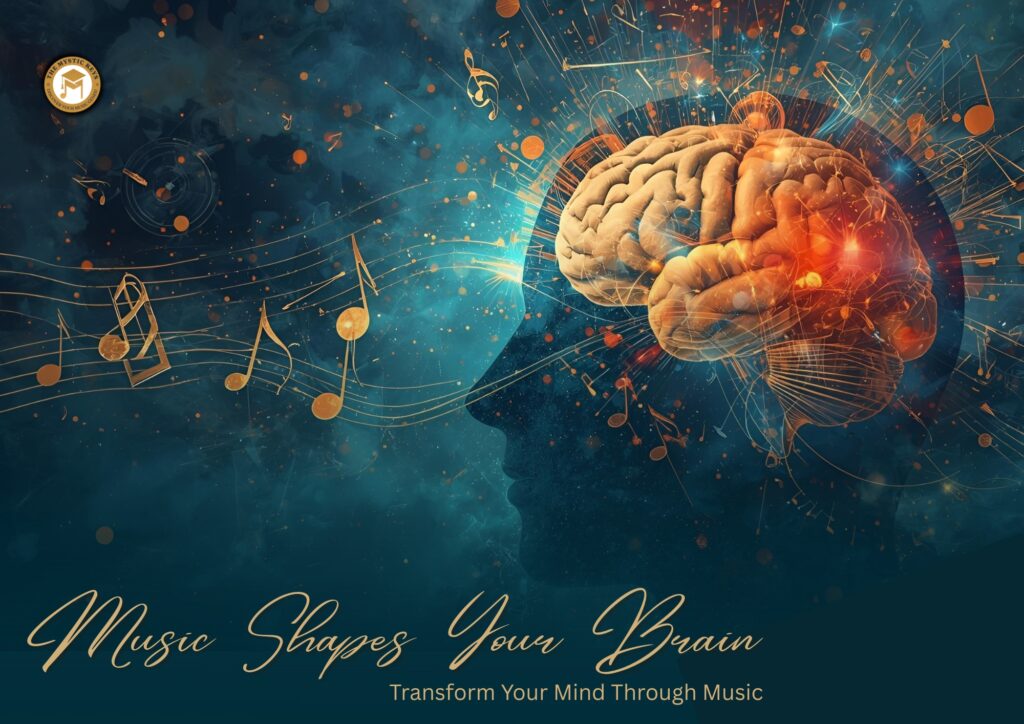Power of Music | How Learning an Instrument Shapes Your Brain
Music has a unique power—it can move us, inspire us, and even heal us. But did you know that learning to play an instrument doesn’t just entertain your mind; it actively reshapes it? From improving memory and coordination to boosting emotional intelligence and cognitive skills, music acts as a kind of mental gym. Whether you’re tickling the piano keys, strumming a guitar, or tapping out rhythms on drums, each note you play sparks a cascade of activity in your brain, strengthening it in remarkable ways.
In this blog, we’ll explore the intricate science behind how learning music shapes your brain, why it makes you smarter, more empathetic, and more resilient, and how you can maximize these benefits.
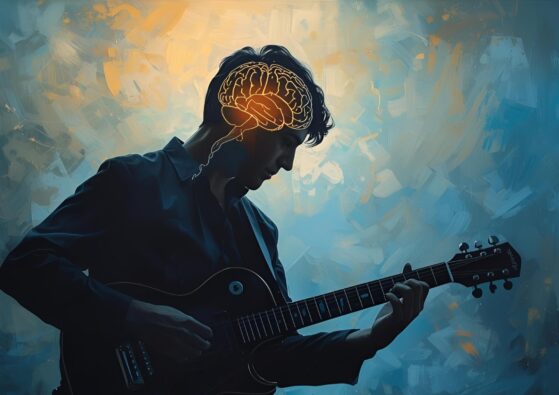
The Brain on Music | A Full Symphony of Neural Activity
When you sit down with your instrument, your brain isn’t idle—it’s firing on all cylinders. Playing music requires coordination between multiple brain regions:
Motor Cortex: Governs finger and hand movements, enabling precise execution of notes.
Auditory Cortex: Processes and interprets sounds, distinguishing pitch, tone, and harmony.
Prefrontal Cortex: Supports planning, problem-solving, and decision-making—essential for learning new pieces.
Cerebellum: Maintains timing, rhythm, and balance, particularly in complex musical passages.
Hippocampus: Involved in memory formation and emotional processing, helping you remember songs and connect with the music emotionally.
Think about it: as your fingers dance across the strings or keys, your brain is simultaneously interpreting sound, anticipating movement, recalling memory, and expressing emotion. It’s like a full-body workout, but for your mind.

Neuroplasticity | The Power of Music to Rewire Your Brain
One of the most fascinating discoveries in neuroscience is neuroplasticity, the brain’s ability to reorganize itself by forming new neural connections. Learning an instrument leverages this ability in profound ways:
Thicker Corpus Callosum: This bundle of fibers connects the left and right hemispheres of the brain, improving coordination between logic and creativity.
Increased Gray Matter: The regions responsible for motor skills, auditory processing, and memory become denser in musicians.
Faster Neural Processing: Musicians’ brains process auditory and motor information more efficiently, not just in music but in other cognitive tasks too.
In essence, consistent practice doesn’t just make you better at music—it physically reshapes your brain, enhancing communication between regions and improving overall cognitive function.
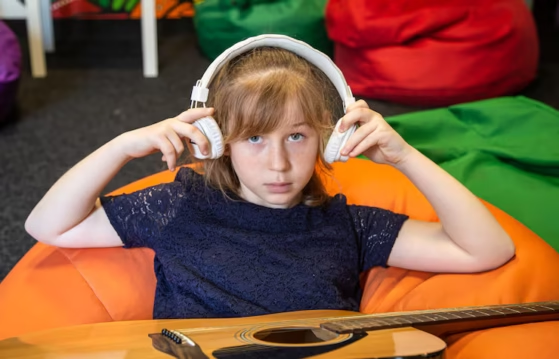
Memory and Cognitive Development Through Music
Learning music is a mental workout in disguise. Memorizing scales, chords, and complex pieces exercises both short-term and long-term memory. Studies show that musical training enhances working memory, which is crucial for daily life tasks like learning languages, problem-solving, or following complex instructions.
Moreover, verbal memory often improves in musicians because the same neural pathways that decode music overlap with language processing. This means learning an instrument can make you sharper not just musically, but academically and socially as well.

Emotional Intelligence | Experiencing the Power of Music
Music is an emotional language. Every note, rhythm, and harmony can evoke feelings, and learning to interpret and express these emotions strengthens emotional intelligence. Here’s how:
Empathy Development: Understanding the emotions behind music helps you relate better to the emotions of others.
Stress Reduction: Playing music reduces cortisol, the stress hormone, and triggers dopamine, which makes you feel good.
Mood Regulation: The rewarding experience of music engages brain areas responsible for pleasure and motivation, helping you manage anxiety and depression.
This emotional engagement explains why people often feel deeply connected to music and why playing in groups—like bands or choirs—can foster social bonds.

Executive Function | The Cognitive Power of Music
Beyond emotions and memory, learning an instrument strengthens executive function, which encompasses planning, focus, and cognitive flexibility.
Attention Control: You must simultaneously read sheet music, monitor your timing, and adjust your movements.
Problem-Solving: Correcting mistakes and improvising teaches analytical thinking and adaptability.
Time Management: Regular practice develops discipline and the ability to prioritize tasks effectively.
In fact, research shows that children who take music lessons tend to perform better in school, particularly in subjects like math, science, and language, thanks to enhanced executive functioning.

Rhythm and Timing | The Hidden Power of Music
Rhythm is at the heart of music. Percussion instruments like drums or even rhythmic piano exercises improve brain function in unique ways:
Motor Coordination: Drumming requires precise hand, foot, and sometimes even body coordination.
Timing and Temporal Skills: Perfect rhythm strengthens your brain’s ability to anticipate patterns and process sequences efficiently.
Math and Pattern Recognition: Understanding beats and subdivisions enhances numerical reasoning and logical thinking.
Even if you never pursue drumming professionally, practicing rhythm exercises boosts your brain’s sequencing and prediction skills—useful in both academics and everyday life.
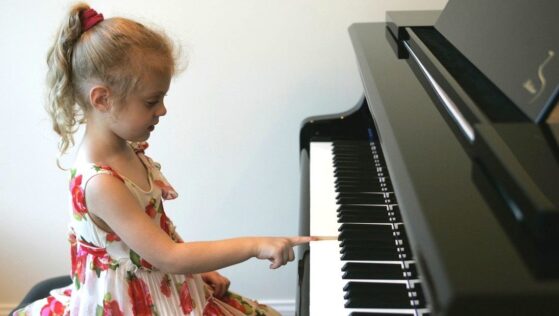
Multisensory Learning | Engaging Your Entire Brain
Playing music is inherently a multisensory experience, and this is where the true Power of Music shines. As you engage with your instrument, your senses work together in harmony: you see the notes or finger placements, guiding your movements with precision. At the same time, you hear the tones you produce, allowing your brain to process and refine the sounds. You also touch the instrument, feeling every vibration and movement beneath your fingers. Meanwhile, your body moves in coordination with the rhythm, integrating physical motion with auditory and visual feedback.
This dynamic interplay of senses does more than just make music enjoyable—it actively strengthens neural pathways, enhances motor coordination, and sharpens spatial reasoning. When multiple senses are engaged simultaneously, your brain learns more efficiently, adapts faster, and builds stronger connections. In this way, the Power of Music transforms playing an instrument into an extraordinary cognitive workout, training your mind as much as your fingers.

Lifelong Benefits | Embracing the Power of Music at Any Age
The benefits of music extend beyond childhood. Adults who learn an instrument experience:
Cognitive Protection: Keeps the brain active and delays age-related decline.
Emotional Health: Reduces stress and combats symptoms of depression.
Social Engagement: Group music activities enhance social connections and emotional well-being.
Even short daily practice sessions can make a profound difference over time. Music is not just for young learners—it’s a lifelong brain booster.
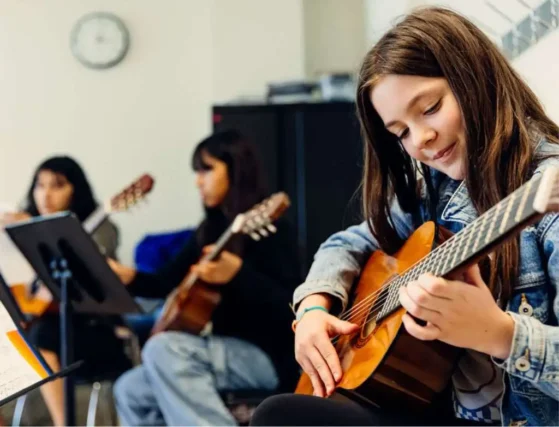
Practical Tips to Maximize the Brain Benefits
Practice Regularly: Short, consistent sessions are more effective than occasional long practices.
Challenge Yourself: Learn new songs, techniques, or instruments to stimulate neuroplasticity.
Listen Actively: Pay attention to pitch, rhythm, and harmony, not just playing notes.
Combine Music with Movement: Conduct, dance, or tap while playing to enhance coordination.
Play with Others: Ensemble playing improves timing, teamwork, and social skills.

Conclusion | Music Is Brain Food
Learning an instrument is far more than just a hobby—it’s a meaningful investment in your brain. With every practice session, you not only enhance memory and attention but also develop emotional intelligence and executive function. This is where the power of music truly shines: it engages multiple areas of the brain at once, strengthening neural connections and supporting overall cognitive growth. Each note you play, every rhythm you master, and every melody you create works together to build a smarter, sharper, and more resilient mind.
At The Mystic Keys, we understand how music can transform lives. Whether your goal is to become a professional musician or simply explore a creative outlet, learning under expert guidance magnifies the brain-boosting benefits of music. The power of music doesn’t just enhance cognitive skills—it uplifts your emotions and enriches your life in ways that few other activities can. So pick up that instrument and start playing—your brain, your heart, and your spirit will thank you for years to come.
For more information and exciting resources about learning music, visit our website at The Mystic Keys. For more music content and exciting offers follow us on
Facebook, Instagram, YouTube, LinkedIn, Twitter, Pinterest, and Threads.


